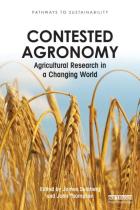 Ramisch, J.J. (2012) ‘This field is our church’: The social and agronomic challenges of farmer participatory research. Chapter 9 in Sumberg, J.E., Thompson, J. (eds.) Contested Agronomy: Agricultural Research in a Changing World. London: Earthscan. Pp. 146-174.
Ramisch, J.J. (2012) ‘This field is our church’: The social and agronomic challenges of farmer participatory research. Chapter 9 in Sumberg, J.E., Thompson, J. (eds.) Contested Agronomy: Agricultural Research in a Changing World. London: Earthscan. Pp. 146-174.
Download the unrevised pdf from ResearchGate here.
ABSTRACT:
Certain types of participation have gained legitimacy amongst agronomists in national and international research centres, e.g. “farmer field schools” and other group-based experimentation / demonstration approaches; participatory ranking exercises for variety appraisals; wealth ranking or other problem trees to identify constraints. This participation imperative means that on-farm research now necessarily engages twin (social and agronomic) objectives – “empowerment”, greater knowledge sharing, and improved social capital on the one hand, which in turn are supposed to foster improved crop husbandry on the other hand, visible as improved crop performance and yields, soil fertility, etc. However, it is not clear that the research products and data gained from these activities are effectively advancing either agronomy or farmers’ welfare.
Case study material from national and international agricultural research on soil fertility management in Kenya illustrates some of the challenges of implementing such participatory technology development. These challenges are related to the political, social dynamics of group-based learning, to the complexities of knowledge generation and sharing in a real, social context, and to the suspect validity and rigour of data generated in these hybrid ventures. Even projects that explicitly tried to subvert these problems were only moderately successful in implementing changes, and many examples show how difficult it was to generate useful (i.e. publishable) agronomic data or conclusions. Local actors ended up perceiving the researchers as “not very good farmers”, while research teams found farmers to be “not very good researchers”, obviously not the middle ground that these participatory approaches hope to achieve.
(Contact me for more information…)